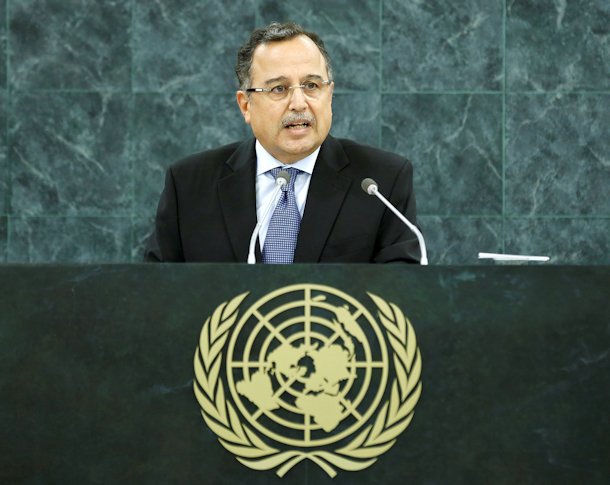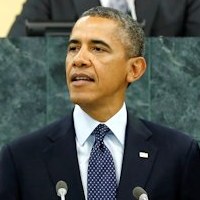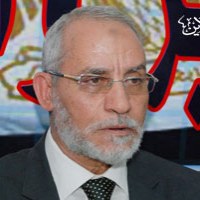![]()
Address to the 68th Session of
The General Assembly of the United Nations
By H.E. Mr. Nabil Fahmy
Minister of Foreign Affairs of the Arab Republic of Egypt
New York, 28 September 2013
Mr. President,
It gives me pleasure to congratulate you, and your friendly country Antigua and Barbuda, for assuming the presidency of the General Assembly at its 68th Session. I take this opportunity to express my sincere appreciation to your predecessor Vuk Jeremic for his efforts during the previous session.
I reiterate our support to the Secretary General as he strives to realize the purposes and principles of the Charter; and welcome choosing “The post-20I5 development agenda” as the main theme of this session considering the high priority the United Nations, and the peoples of the world, accord to the achievement of development in all its dimensions.
Mr. President,
Excellencies, ladies and gentlemen,
Allow me not to follow the normal practices of the General Assembly debates by opening my address with a message I carry to you, and your peoples, from the President of Egypt, Counselor Adly Mansour, and the people of my country, the Egyptians, who have laid the foundation of human civilization, and have recently inspired peoples worldwide.
Egypt holds a unique position in the history of humanity, past and present. Its status, role, and influence, derive essentially from its culture and civilization. It would have been a historical inconsistency had the will of the Egyptians remained shackled at the dawn of a new century, and had our youth remained deprived from the right to draw their own future. It was thus natural for our people to take to the streets on the 25th of January 2011 to declare their determination to build a democratic and modern state, in which their children can enjoy freedom, dignity, and social justice.
This is the Egypt millions of my countrymen and women chose back then… The same Egypt they yearned for on the 30th of June 2013… In doing so, they showed the world that the will of the peoples cannot be broken … That it can grant authority, just as it can remove it from the hands of those who abuse it.
The Egyptians have an ambitious vision for the future that can be achieved through systematic work in a reasonable timeframe. It success is based on a society that is open to all peaceful political streams, pluralistic in a way that embraces the diversity of all its members, and inclusive where the equal rights and duties of all citizens are ensured by the rule of law and equality before justice. The principles and practices of this vision are consistent with the fundamental rules that govern democratic practices throughout the world, mainly the respect for peaceful dialogue, the rejection of violence, and the rule of law.
Our conviction that Egyptians have the right to fulfill this vision underpins the Road Map that Egypt is implementing since the 3rd of July 2013. This Road Map includes a national agenda to build the institutions of a democratic state in a specific timeframe. All Egyptians are invited to participate in all phases of the political process, as long as they are committed to the renunciation of violence and terrorism, and of acts of incitement to them.
Work is underway, in line with the Road Map, on several tracks. It has so far succeeded in establishing the principles of justice, freedom, and democracy, as a basis for governance. This will be followed by parliamentary elections, then presidential elections, so that the transitional phase ends by next spring.
Excellencies, ladies and gentlemen,
We are determined to fully implement the Road Map. This requires us to give utmost priority to the preservation of security and the enforcement of the law, and to counter any intimidation attempts aiming at hindering our efforts.
Some parts of Egypt were recently hit by desperate terrorist attacks. Among their victims were Egyptians from all walks of life, men and women, young and old, Muslims and non-Muslims. These hideous acts of terrorism aim at undermining the democratic process, and destroying our economy.
I have full confidence that the brave Egyptian people, who succeeded in imposing their will, can put an end to terrorism, within the framework of the rule of law. I trust that the international community, which has for long rejected terrorism, will firmly stand by the Egyptian people in the fight against violence and its advocates, and will not accept any attempt to justify it, or tolerate it. I want to seize this opportunity to convey my deep condolences to the government and people of Kenya for the loss of innocent lives as a result of the latest terrorist attack.
Mr. President,
The message I am carrying from the Egyptians, in particular our youth who are joining me here today in representing their country, would not be complete without mentioning Egypt’s aspiration to more democratic international relations, and to stronger ties of cooperation between our people and the rest of the world. These should be based on the principles of independence, mutual respect and non-interference in internal affairs, and on a foreign policy founded on equality and a constructive vision for the future. Egypt’s foreign policy is now a reflection of the will of our people, and is formulated in line with our interests and national security, with no regard to any other consideration.
We fully recognize that Egypt’s national security is linked to the security and concerns of our Arab nation. Given its geographical location, history and identity, Egypt is committed to continue defending the interests of its African continent, address the issues of importance to the Islamic world, spread the Islamic values of moderation and tolerance, and promote dialogue among religions. Egypt also remains committed to tackle the challenges facing the South at a time when the world is witnessing an imbalance of power.
I would like now to briefly highlight Egypt’s position towards several issues of high priority in our foreign policy:
In Syria, the tragedy has reached the point of resorting to chemical weapons. We condemn their use. We view with interest the agreement reached between Russia and the United States in light of our belief in the necessity of addressing the broader context of the crisis in Syria.
While the humanitarian crisis resulting from the raging fighting is unfolding, the Syrian state itself is on the verge of disintegration. It is imperative to reach an urgent political solution. One that would realize the freedom, dignity, and democracy the people of Syria aspire to, and preserve the unity of the state. We hope that this could be achieved through the holding of the Geneva 2 conference, so that a transitional authority can be put in place to end the civil war, as well as the foreign interventions which we have for long warned against.
Mr. President,
The Palestinian question remains the main source of tension in our region, which is still suffering from the effects of the continuation of the Israeli occupation of the Arab territories, and the intensification of settlement activities. The hope of achieving the two state solution was on the verge of fading away irrevocably.
With this bleak picture in sight, we can only but welcome and appreciate the recent efforts exerted by the United States to advance the resumption of the Palestinian-Israeli negotiations. The commitment, so far, by both sides to engage in a process of negotiations, defined by a timeframe, is a significant development. We should all support the ongoing negotiations so that they lead to the final settlement of the Palestinian question which has lasted since the past century.
Egypt will continue to support the right of the Palestinian people to selfdetermination, and the establishment of an independent and sovereign state, with East Jerusalem as its capital, on all the territories of the West Bank and Gaza, and in accordance with the Arab peace initiative and relevant peace terms.
The needs of the Gaza population must be met. Not doing so has become politically and morally unacceptable. We therefore call on Israel and the International community to ensure that the Palestinians in Gaza have access to basic supplies. We are ready to cooperate with the Palestinian authority, and all concerned parties, to agree on appropriate arrangements that guarantee the delivery of provisions in legal and transparent ways.
Mr. President,
You might agree with us that a new Middle East will not come about without ensuring the right to equal security, and getting rid of the threats posed by the existence in our region of nuclear weapons, and weapons of mass destruction. This situation threatens the credibility of the non-proliferation regime, as well as that of the United Nations.
For that reason, and to preserve this credibility, I announce before you today an initiative consisting of the following steps:
First:
Invite all countries of the Middle East, as well as the five permanent members of the Security Council, to deposit official letters to the Secretary General of the United Nations, stating their support for declaring the Middle East a region free from weapons of mass destruction, as well as from nuclear, chemical and biological weapons.
Second:
The countries of the region that have not signed, or ratified, any of the international conventions on weapons of mass destruction, should commit, before the end of this year, to simultaneously sign and ratify the relevant conventions. They should also deposit a proof of that to the Security Council. I invite the Secretary General of the United Nations to coordinate the above steps to ensure their success.
This translates into the following:
- That Israel accedes to the Non-Proliferation Treaty as a non-nuclear state, ratifies the Chemical Weapons convention, and signs and ratifies the Biological Weapons Convention.
- That Syria ratifies the Biological Weapons Convention, and takes the remaining steps it had pledged in relation to the Chemical Weapons Convention.
- That Egypt ratifies the Biological Weapons Convention, and signs and ratifies the Chemical Weapons Convention, provided that all countries of the Middle East complete accession measures to the international conventions prohibiting weapons of mass destruction, and the related arrangements.
Third:
Pursue international efforts to ensure that the delayed 2012 Conference to establish a weapons of mass destruction free zone in the middle east is swiftly held, preferably before the end of this year, and by Spring 2014, at the latest. The Secretary General, the three depositary countries of the Non-Proliferation Treaty, as well as the facilitator should redouble their efforts so that the conference is held within the above timeframe.
Mr. President,
Egypt’s roots are deeply ingrained in Africa. We are proud of the numerous positive changes it has witnessed, as well as the strides it has taken towards democracy and development. Yet, concerted national, regional and international efforts are needed to enable the continent to resolve its conflicts.
Egypt will soon establish an Egyptian Agency for Partnership for Development. Most of its future resources will be directed to African countries so that they can benefit from Egyptian technical expertise.
Mr. President,
We cannot talk about democracy in international relations, and the rule of law at the international level, unless a comprehensive and substantial reform of the United Nations takes place, so that the Organization is better able to respond to challenges, and meet the aspirations of the peoples worldwide.
The only logical and sound way to achieve this desired outcome is through the reform and expansion of the Security Council. Egypt renews its call to end the hegemony of permanent members over the decision-making process in the Council, and to rectify the historical injustice inflicted on Africa. The continent does not have a permanent seat in the Council, and is poorly represented in the category of non-permanent members. Africa will not renounce its demands to obtain the permanent membership it deserves, as specified in the Ezulwini Consensus and the Sirte Declaration.
Mr. President,
As I conclude, I would like to highlight our priority Issues within the United Nations System. They include: strengthening the international human rights framework, addressing the absence of democracy in international governance, accelerating the achievement of the Millennium Development Goals, realizing nuclear disarmament, and fighting corruption, including recovering the assets stolen by key members of the regimes recently brought down by our peoples.
We are determined to continue empowering women, nationally and internationally; and to allow our youth to contribute to the elaboration of Egypt’s vision for the world and for its future. I would like to take this opportunity to welcome the appointment a few months ago by the Secretary General of a Special Envoy for youth from the Arab world.
We must also exert concerted efforts at the international level to combat terrorism, and strengthen the capacity of the United Nations to coordinate these efforts, and to address the root causes of terrorism.
Mr. President,
I truly hope that the message I was carrying from the people and President of Egypt was received by all of you here today.
I also hope that the aspirations it contained will be realized so that we achieve prosperity, peace and development, and that we come back next year to reap the fruits of our labor.
I thank you for your attention.



 RSS
RSS











Latest Comments
Hello Mike, Thank you for your positive feedback to the article. I felt there wasn’t too much critical analysis of ...
Thanks for this considered and well constructed article. A follow up article on the manner in which the editorial contro...
THE CLUELESSNESS OF CLAIMING THAT OBAMA'S MIDDLE EAST POLICIES WERE A FAILURE CANNOT BE FURTHER FROM THE TRUTH, WHAT THE...
As long as Obama is the president of the usa do not trust the us government......
Thank you for an good read....